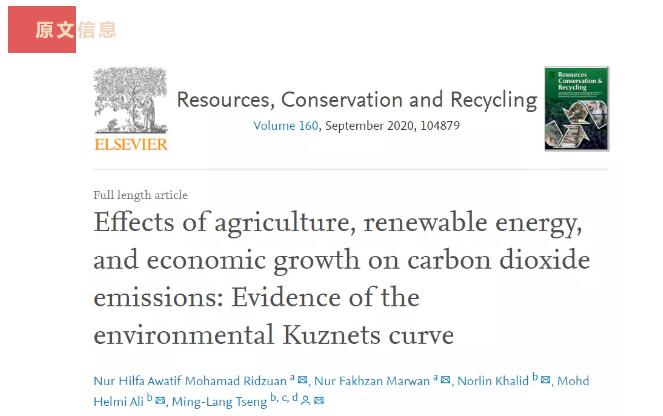 四川省绿色发展促进会
四川省绿色发展促进会

图片来源于网络(侵删)
文章导读
可持续的环境质量是可持续经济发展成功的关键。环境库兹涅茨曲线(EKC)假说应用于建立环境恶化与经济发展之间的实际一致性。EKC指出,经济增长对环境造成了破坏,然而,当经济发展到一定程度,由于国家收入的增加,经济的进一步发展对环境造成的破坏却会减少。先前的研究将人口、外国直接投资和金融发展作为二氧化碳排放的促成因素。然而,很少研究在EKC假设的背景下理解环境恶化和经济发展之间的关系,将其他二氧化碳排放贡献者,如农业、城市化和可再生能源纳入进行研究。
因此,本研究的目标如下:(1)研究不同农业部门与经济发展、可再生能源和城市化对CO2排放的影响。(2)采用自回归分布滞后协整方法(ARDL),在马来西亚EKC假设的背景下,通过关注1978-2016年期间农业的不同子部门,如作物、牲畜和渔业,来检验农业-经济增长-可再生能源-城市化之间的联系。
文章亮点
1.调查不同农业部门(如牲畜、作物和渔业)对二氧化碳排放的影响。
2.从长远来看,畜牧业对二氧化碳排放没有影响。
3.作物、渔业和可再生能源可减少二氧化碳排放。
4.经济增长和城市化增加了二氧化碳的排放。
5.EKC 发现,从长远来看,在达到经济增长阈值水平后,经济增长最终将成为解决环境退化的解决方案。
原文摘要
这项研究有助于:1.发现CO2排放不受现代化的直接影响。2.将可再生能源纳入农业部门,作为有效的二氧化碳排放缓解措施,实现可持续农业。3.应用环境库兹涅茨曲线(EKC)来测试马来西亚属性之间的关系。先前的研究没有探究马来西亚的二氧化碳排放与其经济发展、可再生能源、城市化和农业之间的关联。因此,该研究的目的是调查1978年至2016年期间,马来西亚二氧化碳排放量与经济发展、可再生能源、城市化和农业子部门,如作物、牲畜和渔业等之间的关系。通过对协整的自回归分布滞后检验,从长期来看,由于经济增长和城市化,二氧化碳排放量显著增加,但畜牧业对二氧化碳排放没有大的影响。在此期间,作物、渔业和可再生能源显著减少了二氧化碳排放。此外,这项研究还表明,二氧化碳排放与经济发展之间的联系是颠倒过来的U。这一发现表明,从长期来看,在达到特定的增长水平后,尽管二氧化碳排放和经济发展都在增加,但最终二氧化碳排放还是会减少。这些发现与马来西亚的EKC假说一致。


Abstract
This study contributes to (1) discovering that carbon dioxide (CO2) emissions are not directly influenced by modernisation; (2) attaining sustainable agriculture by incorporating renewable energy into the agriculture sector as an effective CO2 emissions mitigation measure; and (3) applying the environmental Kuznets curve (EKC) to test the relationships among attributes in Malaysia. Prior studies have not addressed the associations between the release of CO2 and economic development, renewable energy, urbanisation, and agriculture in Malaysia. Hence, the objective of the study is to investigate the relationships of the emissions of CO2 and economic development, renewable energy, urbanisation, and agricultural subsectors, such as crops, livestock, and fisheries, in Malaysia for the period 1978 to 2016. By the utilisation of the autoregressive distributed lag test for cointegration, CO2 emissions significantly increased due to economic growth and urbanisation but insig[1]nificantly increased due to livestock in the long term. Crops, fisheries, and renewable energy significantly re[1]duced emissions in this period. Moreover, this study reveals that the association between emissions of CO2 and economic development is an inverted U. This finding indicates that CO2 emissions eventually decrease despite the increase in CO2 emissions and economic development in the long term upon reaching a specific level of growth. These findings are consistent for Malaysia in terms of the EKC hypothesis.